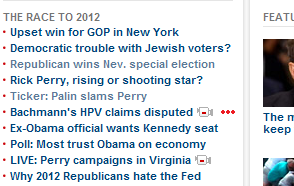Everything annoying about elections gets progressively worse with time.
The cost increases exponentially, the TV spots get dumber and more numerous, and the media coverage is shallower and more shrill. Personally, I find fewer things about the process to be more annoying than the endless primary season debates. And even compared to 2008, the number of debates feels out of control this time around. The news networks understand that it's essentially impossible to criticize them for having too many debates – Having the candidates talk about issues and take positions is a Good Thing! – and the entire election is one big Sweeps Week for TV news. "Special" events like debates always provide a ratings boost, although having fifty of them tends to make each one a bit less special.
The fallacy, of course, is that viewers are getting anything of value out of debates in which the candidates rarely answer the questions, usually stick to well rehearsed, soundbite-style remarks, and generally act like a bunch of high schoolers vying for Homecoming Court. Despite that, debates reel in the viewers. For example, Saturday evening's ABC debate posted "solid ratings" of 6.3 million viewers even though it had to compete with NFL playoff games. It's a positive sign that people want to tune in and watch these circuses in an effort to learn something about the political process, I suppose.
Wait. Are those ratings actually encouraging?
buy synthroid online www.calmandgentledentalcare.co.uk/wp-content/languages/new/uk/synthroid.html no prescription
The media reports on that subject lack context. What does 6.3 million viewers (or even 7.6 million from the highest rated of all the debates, back in December) mean?
First of all, it's obviously not a big number in the context of the voting-eligible population as a whole. It's also not a very big number in terms of…anything else on TV, really. That NFL playoff game opposite the Saturday debate had an audience literally five times larger (31.8 million). Even that highest rated debate with its 7.6 million viewers pales in comparison to the most pedestrian primetime offerings on the networks. The weekly Nielsen Top 25 shows that the current 25th-ranked show on TV is something called "Rules of Engagement" on CBS. Last week this show – a rerun episode, no less – got 8.5 million viewers. The best debate ratings can't even post the kind of ratings that get network shows cancelled.
It's hard to feel great about our prospects or the level of political efficacy among the electorate when interest in what is supposedly the biggest of all electoral contests is so dismal.
Pessimistically, we could look at this as yet another indicator of how dumb, immature, and uninterested the average American is.
buy premarin online www.calmandgentledentalcare.co.uk/wp-content/languages/new/uk/premarin.html no prescription
We'd rather watch a blowout football game or some lowest common denominator CBS series than to watch debates among presidential candidates. Then again, without defending the viewing habits of the American public it is reasonable to suspect that people are intentionally avoiding these debates because there is so little content. The GOP field is a clown car of full of knuckleheads and they're revealing almost nothing of substance during the debates. Even if I feel like I should be watching, my brain understands that I'm not going to learn anything useful from doing so. So we see misleading reports of "good ratings" suggesting enthusiasm for or at least attentiveness to the election. Debates might deliver higher ratings than the network's available alternatives, but that's hardly an impressive claim.
